Olga Núñez Miret's Blog: Author Translator Olga, page 61
September 1, 2016
#Concursoindie 2016 Tres autoras: SIMPLEMENTE PERFECTA de Miriam Meza (@ExtremeDamage), EL DÍA QUE PERDÍ MI SOMBRA de Aída del Pozo (@damadenovelas) y ODIO LA VAINILLA de Merche Maldonado (@MERCHE500). Tres autoras explorando identidades y relaciones.
Hola a todos:
Como sabéis he estado compartiendo algunas de las novelas que me han llamado la atención que se presentan al concurso de novelas indies de Amazon de este año. Aunque decidí dedicarle el mes de Agosto me he quedado corta y se me han quedado muchas en el tintero. Lo siento. Hoy comparto tres de autoras a las que me he encontrado en Twitter y os las traigos en la última entrega. Os mantendré informados de los resultados.
 Simplemente Perfecta de Miriam Meza
Simplemente Perfecta de Miriam MezaSimplemente Perfecta de Miriam Meza
Michael Collins era el consentido de los medios. Este famoso actor llegó a la pantalla grande y se convirtió rápidamente en el sueño húmedo de cada mujer. Atractivo, sexy, millonario y con un halo de misterio. Todas lo deseaban. Algunas lograban, incluso, entretenerlo por algunas horas. Pero no todo sobre Michael era perfección. El actor era también cínico, arrogante y totalmente peligroso para la psique femenina.
Flavia D’Angelo no es de las mujeres que se dejan embaucar fácilmente. Tras su última gira con la Compañía Nacional de Danza regresa a Bari (Italia) para cuidar de su madre y administrar el negocio familiar. La rutina del “pueblo pequeño” empieza a resultarle aburrida hasta que recibe la llamada de su tío Vinnie para pedirle un “favor especial”.
Tras el estreno de su más reciente película, un fantasma del pasado de Michael regresa para sabotear su éxito. Si todo se descubriera, los diarios y revistas del corazón convertirían al ‘Chico de Oro’ en el villano del momento, y su manager no estaba dispuesto a permitirlo.
Vincenzo “Vinnie” D’Angelo siempre tiene un as bajo la manga, y ha encontrado a la persona que lo puede ayudar a sacar a Michael de sus problemas. Una solución, que para él era simplemente perfecta.
Enlace:
https://www.amazon.es/dp/B01JVOZ0JG/
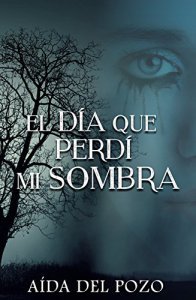 El día que perdí mi sombra de Aída del Pozo
El día que perdí mi sombra de Aída del PozoEl día que perdí mi sombra de Aída del Pozo
“Ni siquiera acierto a recordar qué día perdí mi sombra y dejé de ser yo. Ya ni me reconozco al mirarme en el espejo…”
Así comienza la estremecedora historia de Noelia, una mujer que ha perdido su identidad tras verse atrapada durante años en una relación tóxica. Huir de un mundo de prostitución, drogas y delincuencia es la única salida posible para recuperar la sombra que perdió e iniciar una nueva vida.
Ayudada por Pilar, su mejor amiga de la adolescencia, Noelia emprende una carrera contrarreloj hacia la ansiada libertad, tras huir de Curtis, el hombre que robó su autoestima y que lidera una red de prostitución y drogas en Madrid.
Para conseguir su objetivo, se esconderá en una aldea perdida, a la espera de que Santiago, policía y marido de Pilar, ultime los detalles para proporcionar a la joven una nueva identidad para que recupere el control de su vida.
Mientras Santiago construye un futuro para Noelia en la ciudad de Barcelona; Curtis, ciego por la rabia de haber perdido a quien considera de su propiedad, moviliza a sus hombres para encontrar a su mujer, que parece haber sido tragada por la tierra.
Cuando ya ha perdido toda esperanza de dar con ella, una pista inesperada llevará a su banda hasta Miraflores, un turístico pueblo de la sierra madrileña. La madeja comienza a desenredarse y el cerco en torno a Noelia se estrecha…
¿Logrará la joven recuperar su sombra?
Enlace:
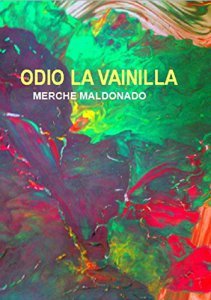 Odio la vainilla de Merche Maldonado
Odio la vainilla de Merche MaldonadoODIO LA VAINILLA de Merche Maldonado
¿Puede un olor transmitir emociones y cambiar el destino? ¿Es posible superar una situación que te horroriza y mezclarse con unos sentimientos encontrados en otra parte del hemisferio?
Son las cuestiones que vertebran «Odio la vainilla», una novela que bajo la apariencia de historia romántica, posee un trasfondo psicológico que nos hace cuestionar qué necesita el ser humano para ser feliz.
Entre la polinesia y Europa, se diferencian dos culturas que se unen en una experiencia de huida de la joven Lovely de su hogar paterno, ante la impotencia por haber sufrido una infancia difícil. Su déspota padre es el hacendado de Hacienda Grande, una plantación de vainilla donde el horror se instaló de nuevo tras el asesinato de su amiga de la infancia.
Lovely se refugia en Barcelona, con la ayuda de su amigo Hiro consigue instalarse en una residencia donde conoce varias personas cruciales, entre ellas a Laura, su compañera de habitación, cuya crueldad precipita los acontecimientos. Los sucesos aparecen encadenados con historias dentro de historias, a través de las cuales se conocen detalles sobre Lovely y sus miedos, así como el pasado de los personajes y sus motivaciones.
Los engaños se suceden y se van desliando conforme va aconteciendo la historia, muchos de ellos ignorantes de su destino y otros traicionados, en un relato donde los buenos no son tan buenos, ni los malos son tan malos.
Enlace:
https://www.amazon.es/dp/B01JMEGFV2/
Muchas gracias a las tres autoras y mucha suerte, gracias a todos vosotros por leer, y ya sabéis, dadle al me gusta, comentad, compartid y haced CLIC!
#Newbook MY VIBRATING VERTEBRAE by Agnes Mae Graham (@Storyreadingape) A fitting homage. And in case you haven’t met the Story Reading Ape…
Hi all:
As you know on Fridays I try to bring you new books. And today I have a very recent book that I thought deserved an introduction.
I’m sure that a lot of you in the blogosphere know The Story Reading Ape and his blog Author Promotions Enterprise. Chris Graham (a.k.a The Story Reading Ape, or perhaps, The Story Reading Ape, a.k.a Chris Graham, I’m never 100% sure) is deservedly known as he works ceaselessly to help and promote writers.
 Chris Graham, The Story Reading Ape
Chris Graham, The Story Reading ApeLet me tell you a bit what he does (in case you haven’t crossed paths with him yet… Where have you been hiding?).
He has a Hall of Fame where he shares features of authors whose work he finds interesting and also of supporters of his blog. Here is the link where you can check both features. If you’re an author but have never been featured in the Hall of Fame or didn’t know about it, you can check here how to go about submitting an article. (Yes, I am featured but I’m not going to pester you with it. If you want to find me, please do…)
If you’re interested in finding writing resources, Chris regularly writes his own, has guests and also generously shares and reblogs content he finds interesting. Go and explore his author resources!
If you’re looking for a great design service, he also provides covers, 3-D covers and videos at bargain prices (and I’d advise you to keep an eye open for special offers). Check here to see what he can do!
He also recommends other people’s services and has great content like the Monday Funnies, so I just advise to explore in general.
OK, I’m sure by now you’re wondering what any of this has to do with the new book. Chris has always said that as much as he enjoys reading and loves the ins and outs of the world of writing, he doesn’t think it’s his thing. But, he decided to do something wonderful. Enter
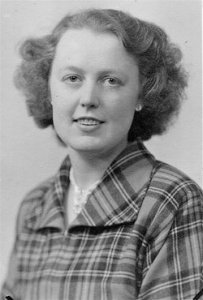 Agnes Mae Graham
Agnes Mae GrahamAgnes Mae Graham is Chris’s mother. She’s no longer with us but she wrote poems. In her day and age, it was difficult (well, almost impossible) to publish and there were no easy options available to everyone as we have now. Chris’s sister Lorna had kept her poems. Chris re-read the poems, talked to another great supporter of authors and great author herself, Jo Robinson, and here is the result:
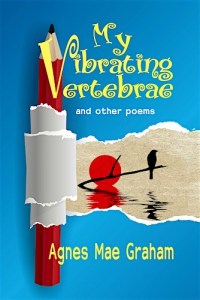 My Vibrating Vertebrae by Agnes Mae Graham
My Vibrating Vertebrae by Agnes Mae GrahamWe all have dreams, loves, and hopes; but what if you are a girl growing up in 20th century Northern Ireland before, during and after the ‘Troubles’?
From the poetic thoughts of our Mother, we get a sense of what it was like, ranging from humor, sadness, wistful thinking and sometimes just downright nonsensical, these are the words of one such girl.
Available from AMAZON:
If you want to read in Chris’s own words how the book came to be, you can check this great post, here.
My father was a great storyteller but he didn’t write. My mother is more of a listener, but I’m planning on prying a few stories out of her while she’s still with us. I love Chris and Lorna’s idea and I had to bring it to you.
Thanks to Chris, Lorna and Agnes Mae Graham for the book, thanks to Chris for all his help to writers, and thanks to you for reading, please, like, share, comment and don’t forget to CLICK and explore not only the book but also the Story Reading Ape’s site.
August 29, 2016
#Concursoindie2016 VÍNCULO DE SANGRE: Legado de E.M. Cuba (@cubaseva78) y NO HAY VUELTA ATRÁS (DEL INFIERNO) de Eduardo Arias (@eduariasGC) Terror y novela negra
Hola a todos:
Como sabéis he estado compartiendo algunas de las novelas que se presentan al concurso de novelas indies. Se me acaba el tiempo así que aprovecho para compartir más esta semana y luego, a otra cosa. Por cierto, andaré de viaje de nuevo así que si no me veis mucho por ahí, no os preocupeis.
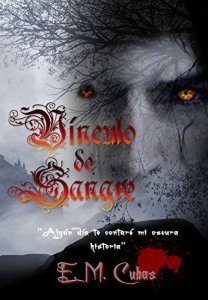 Vínculo de Sangre de E. M. Cubas
Vínculo de Sangre de E. M. CubasVÍNCULO DE SANGRE: Legado de E.M. CUBAS
SINOPSIS
«…Aquella guerra privada mía ponía en peligro a todos los que amaba. Qué estúpido había sido al pensar que atraería el rencor únicamente sobre mí…LESTAT, El Vampiro. ANNE RICE»
¿Y si los mitos sobre vampiros tuvieran un origen real?
Iván no podía saber que un día la extraña herencia familiar llamaría a su puerta y que, lo que creyó desvaríos de su abuelo, encerraba un vínculo más allá de la sangre, más allá de la familia, más allá del tiempo. ¿Qué hacer con un legado en forma de antepasado de más de 3.000 años?
Velkan despertó en un siglo nuevo, en una sociedad nueva, con una familia nueva, pero con la misma sed de sangre, un instinto que lo mantenía vivo desde que nació y al que ni Van Helsing pudo vencer. Cansado de ver cómo durante toda su vida habían matado y profanado los cuerpos de su familia por causa de su naturaleza, cansado de las luchas por su protección, incapaz de verse amado y harto de que lo llamaran monstruo, strigoi, vampiro o dracul, decidió poner fin a su existencia, sin conseguirlo.
Cuando Velkan e Iván se encuentran se crea entre ellos algo más que el heredado vínculo familiar y empiezan a confiar el uno en el otro. Velkan le contará su paso por la historia hablándole de la edad de los metales en la que nació, de Vlad III, el empalador, y le mostrará lo que realmente pasó en Londres en los años del Drácula de Bram Stoker.
¿Podrá Velkan por fin encontrar su lugar? ¿Podrá evitar que sigan creyéndole un vampiro?
Una revisión original y distinta de las leyendas de vampiros, del folklore que existe sobre ellos y de la arqueología, una vuelta de tuerca al mito que te sorprenderá.
Enlace:
https://www.amazon.es/V%C3%8DNCULO-SANGRE-Legado-E-M-CUBAS-ebook/dp/B01HV4NGK8/
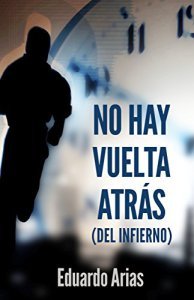 No hay vuelta atrás (del infierno) de Eduardo Arias
No hay vuelta atrás (del infierno) de Eduardo AriasNo hay vuelta atrás (del infierno) by Eduardo Arias
No hay vuelta atrás (del infierno) es la historia de un hombre sin nombre, un policía apátrida infiltrado en una unidad especial que, sin saber ni cómo ni cuándo, parece haber cabreado a mucha gente. Un inesperado ultimátum le sumerge de lleno en una carrera contrarreloj en la que deberá conseguir devolverle una importante suma de dinero a un capo mafioso o atenerse a las consecuencias.
Relatada en primera persona, con un estilo sarcástico y rompiendo reiteradamente la cuarta pared, la novela nos lleva de un lado para otro, pasando por ciudades como Londres o Edimburgo, en un auténtico torbellino de sospechas, traiciones, amor, odio, persecuciones, disparos y muertes, muchas muertes. Todo ello con incesantes guiños a la cultura pop (Tarantino, Guy Ritchie, David Bowie, Foo Fighters…).
¿Será el protagonista capaz de desenmarañar todo el enredo y salir indemne? Sólo lo sabrás leyendo esta novela. Y es que, como él mismo relata, las cosas nunca salen como uno prevé.
Enlaces:
https://www.facebook.com/eduariasGC/
http://rxe.me/TTFRPW
Gracias a los dos autores por sus novelas, y mucha suerte, a vosotros por leer, y ya sabéis, dadle al me gusta, comentad, compartid y haced CLIC!
#BookReview THE SECRET DIARY OF HENDRIK GROEN, 83 ¼ Years Old by Hendrik Groen (25th August) We might all be dying but there’s no need to get gloomy about it #TuesdayBookBlog
Hi all:
I’m going on my travels again and I’ve managed to accumulate a lot of reading material, blog tours postings, and reviews I should share for the month of September (when if I’m to judge by the amount of request for reviews I’ve got, there will be an avalanche of new books, brace yourselves!) so if you see a lot of book reviews, don’t worry. I’ll will be there, reading, editing (yes, I’m getting there with lots of help and I hope my book will be out before Christmas… Some early ARCs have gone to readers already. Bless them. )
So here comes one of my reviews. I really loved this book but I was waiting to share it until it was published. It’s been available in other countries and other languages for quite a while but well, here it is…
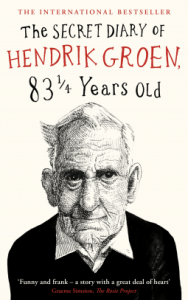 The Secret Diary of Hendrik Groen 83 1/4 Years Old by Hendrik Groen (? well, we don’t know)
The Secret Diary of Hendrik Groen 83 1/4 Years Old by Hendrik Groen (? well, we don’t know)The Secret Diary of Hendrik Groen, 83 ¼ Years Old by Hendrik Groen. We might all be dying but there’s no need to get gloomy about it
Description
** THE INTERNATIONAL PHENOMENON ** ‘
‘Another year and I still don’t like old people. Me? I am 83 years old.’
Hendrik Groen may be old, but he is far from dead and isn’t planning to be buried any time soon. Granted, his daily strolls are getting shorter because his legs are no longer willing and he had to visit his doctor more than he’d like. Technically speaking he is … elderly. But surely there is more to life at his age than weak tea and potted geraniums?
Hendrik sets out to write an exposé: a year in the life of his care home in Amsterdam, revealing all its ups and downs – not least his new endeavour the anarchic Old-But-Not Dead Club. And when Eefje moves in – the woman Hendrik has always longed for – he polishes his shoes (and his teeth), grooms what’s left of his hair and attempts to make something of the life he has left, with hilarious, tender and devastating consequences.
The indomitable Hendrik Groen – Holland’s unlikeliest hero – has become a cultural phenomenon in his native Netherlands and now he and his famously anonymous creator are conquering the globe. A major Dutch bestseller, The Secret Diary of Hendrik Groen will not only delight older readers with its wit and relevance, but will charm and inspire those who have years to go before their own expiry date.
Advance Praise
Praise for The Secret Diary of Hendrik Groen, 83 ¼ Years Old
‘Hendrik Groen’s account of daily life in a care home for the elderly pulled me in with its self-deprecating humour, finely drawn characters and frank accounting of the trials of old age. Behind Hendrik’s light touch and grumpy-old-man persona is a story with a great deal of heart, and some important themes. Hendrik effortlessly incorporates the politics of aged care, from funding to euthanasia, into his personal story and offers his own acerbic insights. Anyone who has a friend or relative in a nursing home or retirement village, or who hopes to grow old with dignity themselves, will find much to reflect on’. Graeme Simsion, international bestselling author of The Rosie Project
‘There are many laughs in this book but it’s so much more than just a comedy. It’s a story about how friendship, selflessness and dignity lie at the heart of the human experience. When I’m an old man, I want to be Hendrik Groen’. John Boyne, author of international bestseller The Boy in the Striped Pyjamas
‘Funny, tragic and sometimes heart rending’. Het Parool
‘Hendrik Groen is a heart-warming hero’. Trouw
‘With pungent phrasing Groen takes down life in a retirement home. Both charming and hilarious’ ****Leeuwarder Courant
‘Hendrik Groen is king. My mother (78) suffers from dementia. Doesn’t read a newspaper or magazine anymore, only old photo albums can grab her attention for longer than 5 minutes. Hendrik Groen made her laugh out loud’. Ray Kluun, author of Love Life
‘The tears came streaming down my face. From laughing so hard. I couldn’t stop grinning for three days’. Ouderenjournaal
‘Never a dull moment with my new BFF Hendrik Groen’. Read Shop, Hedel
‘It reminded me of a combination between The Hundred-Year-Old Man Who Climbed Out of the Window and Disappeared and One Flew Over the Cuckoo’s Nest. Wonderful! Shame it’s finished already’. Arjen Broers, Bookshop Bruna
‘Heart-warming, funny and poignant. It’s about all aspects of life. EVERYBODY should read this’. Bookshop Stevens
My review:
Thanks to Net Galley and to Penguin UK-Michael Joseph for providing me with a free copy of the book in exchange for an honest review.
The description of this book drew me in from the beginning as the protagonist and supposed diarist of the book is correct when he talks about the increased interest in old age pensioners and how they appear to be the subject of everything, from movies to laws. Whatever our age, as another one of the characters tells Hendrik, if you don’t know somebody with dementia (let’s change that to senior citizen) you’re sorely out of fashion. I didn’t realise at the time that the book had been a great success in the Netherlands and in many other countries (including Spain, where I was at the time). I’m not sure why it took so long to be published in an English version but I’m glad it finally did.
I have enjoyed the resurgence of movies with older protagonists, not only because of the original perspective given to the stories, but also because they provide a great chance to see (in most cases together) many of the actors and actresses one has learned to love over the years but who no longer fit into the usual bestselling production. This novel isn’t either the typical bestselling book. It’s not an action book or a thriller (as Hendrik says on a number of occasions, a traffic congestion in the residential home where he lives might be caused by too many people trying to use the lift at the same time with their walking aids, and going for a walk once a day is seen as a big adventure), it isn’t a hot romance (yes, there is romance but gentle and understated), a chick-lit book (the protagonist is a Dutch man who is 83 at the beginning of the book), or a paranormal or science-fiction offering. These are the secret writings of a man (although the true author has not been revealed and the book is classed as humour and fiction) in a residential home who, at the beginning of the year 2013, decides to start writing a diary, because having a goal, however small, helps keep depression and sad thoughts at bay. Despite what I said, there are adventures. He and some friends (some old, some recent, including a love interest) get together in an attempt at fighting apathy and enforced old-age and create the Old-But-Not-Dead club, and they set off on their adventures. There is also intrigue and spy missions (trying to get hold of a copy of the infamous regulations that seem to impede any fun or flexibility within the walls of the institution), there are sad moments (illnesses, both physical and mental, and death), political and social commentaries (of Dutch politics and international affairs, always sharp and mocking), and there are flashy vehicles (there are debates about the best mobility scooters and some driving mishaps).
Added to the varied and unforgettable plot elements are the characters. The book is narrated in the first-person by Henrik Groen. We only get tiny snippets of his previous life (sad events and circumstances that move us but he doesn’t dwell upon) but he has a penchant for observing and commenting on the everyday with a fresh, mocking and humorous eye, not devoid of tenderness. He might be getting on but the really old people are those around him. His loyalty to his friends (not withstanding his objective appraisals of their qualities and defects), his lack of self-pity and his self-deprecating attitude, always trying to see the funny side of things (and trying to remain optimistic), his generosity and willingness to help others no matter what his heart and mind say, and his willingness to fight for what is right and to never hide from unpleasant, embarrassing or difficult subjects (i.e. euthanasia) make him unique and endear him to the reader. He’s a hero and the cast of friends, bit players, enemies and even the dog and the poor fishes (sorry, you must read the book to know what I mean) create a microcosm that we can’t help but care for.
The book is an easy read, and it adopts British English colloquialisms and sayings that would fit in perfectly with somebody of Hendrik’s age (if he was from the UK).
I loved the book. I laughed, cried, and it made me think: about living every day to the maximum, about having goals, about the future, about relatives and also, about myself. I hope if I get to that age there’ll be a Hendrik wherever I end up. (Or I’ll be like Hendrik). A fabulous read.
Links:
e-book: https://www.amazon.co.uk/Secret-Diary-Hendrik-Groen-Years-ebook/dp/B01DOSVSNW/
https://www.amazon.com/Secret-Diary-Hendrik-Groen-Years-ebook/dp/B01DOSVSNW/
Hardcover: https://www.amazon.co.uk/Secret-Diary-Hendrik-Groen-Years/dp/0718183002/
https://www.amazon.com/Secret-Diary-Hendrik-Groen-Years/dp/0718183002/
Audible: https://www.amazon.com/Secret-Diary-Hendrik-Groen-Years/dp/B01KKMXBIA/
I’m sure you’ll see it everywhere, if I’m to judge by its distribution in Spain, but I thought I’d recommend it early anyway.
Thanks again to NetGalley and to Penguin UK-Michael Joseph for the early copy, thanks to you all for reading, and you know what to do, like, share, comment, and of course, if you want a great read, CLICK!
August 25, 2016
#ConcursodenovelasindiesdeAmazon DOCE TRíOS Y DOCE A SOLAS de Ana Larranz Galé, Esther Santana Correa y Purificación Estarli (@PEstarli) y ÁNGELES DE GRANITO de Esteban Navarro (@EstebanNavarroS)
Hola a todos:
Como sabéis me intrigan mucho las novelas que se presentan al concurso de novelas indie de Amazon, y desde luego las hay de todos géneros y estilos. Hoy os traigo un libro escrito entre tres autoras (las colaboraciones me fascinan y Puri Estarli ha sido mi invitada en otras ocasiones) y un libro que me intrigó por el título y la historia promete mucho. A ver qué os parecen.
 Doce tríos y doce a solas de Esther Santana Correa, Purificación Estarli y Ana Larraz Galé
Doce tríos y doce a solas de Esther Santana Correa, Purificación Estarli y Ana Larraz GaléDoce tríos y Doce a solas: Relatos escritos al alimón entre tres amigas de Ana Larraz Galé, Esther Santana Correa , Purificación Estarli
Tres plumas radiantes, tres corazones ilusionados, tres almas llenas de emociones, sentimientos, vivencias. Un día se encontraron y comenzaron a transmitir, por medio de sus escritos, relatos conmovedores, algunos tristes y otros alegres, relatos de vivencias reales, de mensajes que les llegaban de lo más profundo de su espíritu.
EL destino quiso que las tres almas errantes se encontraran para compartir la pasión por escribir historias y comenzaron una historia divertida, amena, una historia en donde una aprendía de las otras.
De esa manera comenzó este libro. Purificación Estarli, Ana Larraz y Esther Santana se iniciaron en la aventura de escribir doce relatos en los que cada una imprimía su estilo, su manera de vivir lo que las otras habían transmitido, a veces empezando, otras terminando. Doce relatos llenos de pasión e ilusiones.
Impulsadas por el afán de darle otro sentido al relato que cada una comenzó, cada una terminó el relato inspirado en ella, surgiendo Doce tríos y doce a solas.
https://www.amazon.es/Doce-tr%C3%ADos-solas-Relatos-escritos-ebook/dp/B01HUEPFE4/
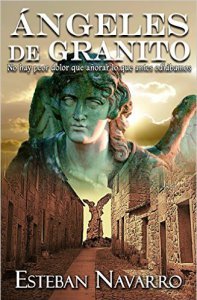 Ángeles de granito de Esteban Navarro
Ángeles de granito de Esteban NavarroÁngeles de granito de Esteban Navarro
Ángeles de granito fue finalista en el X premio de novela Ciudad de Badajoz y en el IV premio de novela Ciudad de Almería.
En la España de 1975 Martín Heredia tiene 10 años y sufre una extraña enfermedad degenerativa que está corroyendo sus huesos por completo. Aconsejados por sus vecinos la familia decide trasladar a Martín desde Barcelona a Torremesina, un Santuario que tiene fama por sus milagros.
La familia emprende el viaje en coche y cuando llegan a la Loma Santa, una urbanización de casas de granito a media hora del Santuario, les sorprende la desolación y atmósfera inquietante del lugar. Y a pesar de la desconfianza de Juana, la madre del niño, aceptan la hospitalidad de Ezequiel, un anciano que los conduce a su casa.
Durante los días siguientes comienzan a ocurrir situaciones inquietantes que la familia no comprende. Se desata una plaga de langostas, seguida de una de ranas y otra de piojos. Además el padre de Martín, Luis, tiene una visión de un hombre con cabeza de saltamontes que se pasea frente a la casa de Ezequiel, delante de la figura de un ángel de granito que, ante su incrédula mirada, moverá ligeramente los ojos.
Más información: www.estebannavarro.es
https://www.amazon.es/%C3ngeles-granito-Esteban-Navarro-ebook/dp/B01HUFD7MK
Artículo en eriginal
Gracias a los autores por traernos sus libros y mucha suerte en el concurso, gracias a todos por leer, y si os ha interesado, dadle al me gusta, comentad, compartid y haced CLIC!
New #audiobook Click Me Happy! A romantic novella with three endings now narrated by Afton Laidy Jordan
Hi all:
As I’ve been telling you, as much as we love reading and seem to spend most of our days doing it, there’s also a current move towards making the most of our time by listening to things whilst we are busy driving, walking, running, exercising, doing chores… anything that isn’t too mentally demanding. There are podcasts, of course good old and new radio, and audiobooks.
Another one of my novels is now available as an audiobook (I have a few more on the making but it’s a bit of a laborious process).
 Click Me Happy! Audiobook. Narrated by Afton Laidy Jordan
Click Me Happy! Audiobook. Narrated by Afton Laidy JordanAfton Laidy Jordan, who’s also narrated Twin Evils? decided to try my experimental romantic novella, where I decided to give the readers the option to choose between three endings.She gives the novella the fun and quirkiness it deserves. In case you don’t remember it or you joined me after its publication, here I give you Click Me Happy! A Romantic Novella with Three Endings
Lilith, the protagonist, does not believe in all that ‘romantic nonsense’. When her boss and friend, Debbie, asks her to create a digital books section for the library where they both work, she triggers a series of events that shake all of Lilith’s strongly held beliefs.
Her dislike for social networking is put to the test and despite her love for privacy and technological naïveté she manages to make a number of virtual connections. The most interesting one, without a question, is Zane, a talented and attractive author and painter. Their friendship quickly develops into something else. But, what exactly? Lilith doesn’t have a clue.
A bet with Rowena, her childhood best-friend, offers her an opportunity to test her feelings for Zane and their relationship, and a meeting, ‘real’ this time, is organised in the gorgeous setting of Bermuda.
At that point, you, the reader, have the choice. Do you want the story to end up happy ever after? Do you think there’s no chance for them? Or maybe you believe that there has to be more to life than romantic stories and a neutral ending or new beginning is more true to life? There are three endings for you to pick from. See what you think!
AUDIBLE.COM AUDIBLE.CO.UK AMAZON.COM AMAZON.CO.UK APPLE (iTunes)
If you’ve never bought any audiobooks from Audible, you must check this great opportunity to get the audio for free.
You can listen to a sample in Soundcloud:
Or if you prefer, you can watch and listen to a video in You Tube.
I’m waiting for the Audible free codes, but let me know if you might be interested in one and I’ll keep you posted as soon as I get them. (Ah, and don’t worry if you can’t resist the curiosity. Most of the readers go ahead and read the three endings;)
Thanks for reading, watching and listening, thanks to Afton for her fantastic work, and you know what to do, like, share, comment and CLICK!
August 22, 2016
#Autoraclásica invitada. Rosalía de Castro. Gallega por excelencia
Hola a todos:
Hace tiempo dije que iba a dedicarme a revisitar algunos de los posts de escritores clásicos que había compartido en mi otro blog, y no sé si será porque mi padre era gallego (de Ourense) o porque solíamos ir allí de vacaciones en verano, pero esta época del año me recuerda aquellas tierras. En el caso de Rosalía de Castro, la gran escritora Mexicana Adelfa Martín leyó uno de mis otros posts sobre los clásicos y me sugirió que le dedicase uno a Rosalía. Y fue un placer. Aquí os lo traigo.
A petición de Adelfa Martín, y porque todavía no había traído una autora clásica, aquí os traigo Rosalía de Castro.
Como suele ser el caso hay mucha información sobre Rosalía de Castro y comparto enlaces para que investiguéis más, pero os dejo una breve biografía.
Biografía:
Rosalía de Castro nació el 24 de Febrero de 1837 en Santiago de Compostela. Hija natural de un sacerdote y de una hidalga soltera con pocos recursos económicos. Fue registrada como hija de padres desconocidos (María Rosalía Rita), y se libró del orfanato al hacerse cargo de ella su madrina, María Francisca Martinez, que era sirviente de su madre.
Hasta los ocho años estuvo bajo custodia de su tía paterna, Teresa Martínez Viojo, en la aldea de Castro de Ortoño, en la provincia de la Coruña. Allí se familiarizó con el mundo rural gallego, la lengua, las historias, las costumbres… que tanto influirían en su obra. Sobre el 1850 se trasladó a Santiago de Compostela donde vivió con su madre. Allí recibió la educación típica de una joven de la época y conoció figuras intelectuales como Manuel Murguía (no se sabe seguro si se conocieron allí o en Madrid años después), Eduardo Pondal y Aurelio Aguirre.
En 1856 se trasladó a Madrid con la familia de una parienta, y al año siguiente empezó a publicar poesías en castellano, como La flor, bien recibida por Murguía.
De Castro se casó con Murguía en 1858. Hay diversas versiones de la relación entre ella y su marido, aunque públicamente apoyó su carrera literaria, y fue responsable de la publicación de Cantares Gallegos. La pareja tuvo 7 hijos, 5 hijas y dos hijos. Una de las hijas, la más joven, nació muerta, y uno de los hijos murió a los 19 meses al caerse de una mesa. Todos nacieron en Galicia.
El matrimonio cambió a menudo de residencia, debido a dificultades económicas, de salud, y a requerimientos profesionales. Vivieron en La Coruña, Madrid, Santiago, Madrid, Lugo, Santiago, Extremadura, Andalucía, Castilla La Mancha y Levante. En Septiembre de 1868 hubo el levantamiento revolucionario conocido como La Gloriosa y Muguías pasó de secretario de la Junta de Santiago a director del Archivo de Simancas. A partir de entonces su vida pasó entre Madrid y Simancas, donde escribió la mayoría de las composiciones de Follas Novas. En esta época De Castro conoció a Gustavo Adolfo Bécquer. Desde 1871 vivió siempre en Galicia (Torres de Lestrove, Dodro, Santiago de Compostela y Padrón).
Sus últimos años los pasó en Padrón. La casa donde había crecido ya no pertenecía a la familia y finalmente se trasladó a una casa llamada La Matanza.
Nunca tuvo buena salud y después de pasar una temporada cerca del mar murió el 15 de Julio de 1885 de cáncer de útero.
Sus obras fueron menospreciadas durante su vida. No fue hasta los modernistas y la generación del 98 que su figura se vio revalorizada. Los escritores del 98, en particular Azorín y Miguel de Unamuno le dedicaron 6 artículos (en 1911 y 1912). Otros escritores de la generación no comentaron mucho y Ramón María del Valle-Inclán fue negativo (a pesar de ser amigo de su marido). Juan Ramón Jiménez, por su parte, se deshizo en elogios sobre De Castro y la consideró innovadora y precursora del modernismo español.
El Día de la Letras Gallegas se celebra cada 17 de mayo, conmemorando la publicación de su obra Cantares Gallegos.
Hoy en día De Castro es reconocida internacionalmente, con escuelas y centros educativo con su nombre en España y el extranjero (un teatro en Venezuela), parques, plazas, premios, asociaciones culturales, bibliotecas, un vino… Hasta el 1979 su retrato aparecía en el reverso de los billetes de 500 pesetas, lo que la convirtió, con Isabel la Católica, en el único personaje histórico femenino no alegórico en un billete español.
Es una de las figuras emblemáticas del Rexurdimento gallego, no solo por sus escritos (sus Cantares Gallegos están considerados como la primera gran obra de la literatura gallega contemporánea), sino por que se ha convertido en el símbolo por excelencia del pueblo y la cultura gallegos.
Rosalía de Castro escribió en prosa pero es más conocida por sus obras en poesía: Cantares Gallegos, Follas Novas y En las orillas del Sar.
Os dejo enlaces a su obra, pero pensé que unas muestras no vendrían mal:
Ya no mana la fuente, se agotó el manantial…
Ya no mana la fuente, se agotó el manantial;
ya el viajero allí nunca va su sed a apagar.
Ya no brota la hierba, ni florece el narciso,
ni en los aires esparcen su fragancia los lirios.
Sólo el cauce arenoso de la seca corriente
le recuerda al sediento el horror de la muerte.
¡Mas no importa! A lo lejos otro arroyo murmura
donde humildes violetas el espacio perfuman.
Y de un sauce el ramaje, al mirarse en las ondas,
tiende en torno del agua su fresquísima sombra.
El sediento viajero que el camino atraviesa,
humedece los labios en la linfa serena
del arroyo que el árbol con sus ramas sombrea,
y dichoso se olvida de la fuente ya seca.
Sed de amores tenía…
Sed de amores tenía, y dejaste
que la apagase en tu boca,
¡piadosa samaritana!
Y te encontraste sin honra,
ignorando que hay labios que secan
y que manchan cuanto tocan.
¡Lo ignorabas…, y ahora lo sabes!
Pero yo sé también, pecadora
compasiva, porque a veces
hay compasiones traidoras,
que si el sediento volviese
a implorar misericordia,
su sed de nuevo apagaras,
samaritana piadosa.
No volverá te lo juro;
desde que una fuente enlodan
con su pico esas aves de paso,
se van a beber a otra.
Soledad
Un manso río, una vereda estrecha,
un campo solitario y un pinar,
y el viejo puente rústico y sencillo
completando tan grata soledad.
¿Qué es soledad? Para llenar el mundo
basta a veces un solo pensamiento.
Por eso hoy, hartos de belleza, encuentras
el puente, el río y el pinar desiertos.
No son nube ni flor los que enamoran;
eres tú, corazón, triste o dichoso,
ya del dolor y del placer el árbitro,
quien seca el mar y hace habitable el polo.
Te amo… ¿Por qué me odias?…
Te amo… ¿Por qué me odias?
-Te odio… ¿Por qué me amas?
Secreto es éste el más triste
y misterioso del alma.
Mas ello es verdad… ¡Verdad
dura y atormentadora!
-Me odias porque te amo;
te amo porque me odias.
Pobre alma sola!, no te entristezcas…
¡Pobre alma sola!, no te entristezcas,
deja que pasen, deja que lleguen
la primavera y el triste otoño,
ora el estío y ora las nieves;
que no tan sólo para ti corren
horas y meses;
todo contigo, seres y mundos
de prisa marchan, todo envejece;
que hoy, mañana, antes y ahora,
lo mismo siempre,
hombres y frutos, plantas y flores,
vienen y vanse, nacen y mueren.
Cuando te apene lo que atrás dejas,
recuerda siempre
que es más dichoso quien de la vida
mayor espacio corrido tiene.
Ésta dedicada a todas las mujeres:
Meditación en el umbral
No, no es la solución
tirarse bajo un tren como la Ana de Tolstoy
ni apurar el arsénico de Madame Bovary
ni aguardar en los páramos de Ávila la visita
del ángel con venablo
antes de liarse el manto a la cabeza
y comenzar a actuar.
Ni concluir las leyes geométricas, contando
las vigas de la celda de castigo
como lo hizo Sor Juana. No es la solución
escribir, mientras llegan las visitas,
en la sala de estar de la familia Austen
ni encerrarse en el ático
de alguna residencia de la Nueva Inglaterra
y soñar, con la Biblia de los Dickinson,
debajo de una almohada de soltera.
Debe haber otro modo que no se llame Safo
ni Mesalina ni María Egipciaca
ni Magdalena ni Clemencia Isaura.
Otro modo de ser humano y libre.
Otro modo de ser.
Mi padre es gallego, y me pareció que no sería justo no incluir algún poema en gallego. Y aquí van un par:
De soidás morríase
na vila, sospirando pola aldea;
asombrábana as casas cos seus muros,
e asombrábana as otres e as igrexas.
As rúas enlousadas somellábanlle,
sin verdor nin frescura,
cimeterio onde os mortos
fora andaban das tristes sepulturas.
I as comidas sabíanlle
a fariña sin sal i a xaramagos,
i as poucas que tocaba,
en vez de darlle alento a iñan matando.
Algunha vez chegaban hastra ela,
non sei si en ilusión si de verdade,
uns agrestes olidos
de leixanas ribeiras e pinares.
Íñase estonces a sentar nun alto,
contempraba os estensos horizontes,
e rompendo en sospiros que a afogaban,
ronca escramaba saloucando: “¡Eu voume!”
¡E íñase apresa sin remedio…! ¡Íñase
coa tristeza mortal que a consumía!
Íñase a probe Rosa,
pero… ¡para a outra vida!
(Follas Novas)
Y un poema que es de lo más actual:
-Escoitá: os algoasiles
andan correndo a aldea;
mais ¿cómo pagar, cómo, si un non pode inda pagar a renda?
Embargaránnos todo, que non teñen
esas xentes concencia, nin tén alma.
¡Quedaremos por portas,
meus fillos das entrañas!
¡Mala morte vos mate
antes de que aquí entredes!
Dos probes, ao sentirvos,
os corazós, ¡cál baten tristemente!
-María, se non fora
porque hai un Dios que premia e que castiga,
eu matara eses homes
como mata un raposo a unha galiña.
-¡Silencio! ¡Non brafemes,
que éste é un valle de lágrimas…!
Mais ¿por qué a algúns lles toca sufrir tanto,
i outros a vida antre contentos pasan?
(Follas Novas)
Y seguiría, pero….
Enlaces:
Biografía e información general:
Wikipedia (es):
http://es.wikipedia.org/wiki/Rosal%C3%ADa_de_Castro
Fundación Rosalía de Castro (en galego) Biografía, obras, información, noticias:
Biografías y vida:
http://www.biografiasyvidas.com/biografia/c/castro_rosalia.htm
Enlaces a las obras (gratis):
Obras completas para descargar:
http://www.rosaliadecastro.com/
De aquí he tomado prestadas algunas de sus obras:
http://www.amediavoz.com/decastro.htm
Más poemas:
http://www.poemas-del-alma.com/rosalia-de-castro.htm
De aquí tomé prestados los poemas en galego:
http://poemasderosalia.blogspot.co.uk/search/label/Follas%20Novas
Programa emitido en RTE sobre ‘Negra Sombra’:
http://www.rtve.es/television/20130914/negra-sombra-poema-rosalia-castro/744761.shtml
Gracias por leer, y si os ha gustado no os olvidéis de darle al me gusta, comentar, compartir y hacer CLIC (que es gratis)! Y perdonad que me haya quedado tan largo, pero me pareció que se lo merecía.
 English: Rosalía de Castro signature. Galego: Sinatura de Rosalía de Castro. Español: Firma de Rosalía de Castro. (Photo credit: Wikipedia)
English: Rosalía de Castro signature. Galego: Sinatura de Rosalía de Castro. Español: Firma de Rosalía de Castro. (Photo credit: Wikipedia)Related articles
Santiago photos (nancysuecamino.wordpress.com)
#Authors, should you be thinking about translating your book? #amwriting
Hi all:
 The Manchester book fair. I’m sure I’ll manage to fit in a post and some photos… soon
The Manchester book fair. I’m sure I’ll manage to fit in a post and some photos… soonIn the maelstrom of visits, book fairs, editing jobs, other jobs, reading and reviewing books, I was checking posts I’ve published elsewhere and was surprised to realise that I had forgotten to share here a post I published in Lit World Interviews about translations that had quite a few comments and I thought, in case you’d missed it, it was worth sharing here too. See what you think.
See what you think and I’ll keep you posted on everything.
Hi all:
As some of you may know, apart from blogging , mostly about books , I am a writer and I translate books from English to Spanish and from Spanish to English. A few months back and as part of a book fair I was asked to talk about translations and I prepared a few notes. Although the full speech is a bit lengthy for a single post, I thought that in preparation for further interviews with author translating their books (and by the way, any authors who’ve had their books translated to Spanish, I’d be more than happy to share them in my blog after the summer. Just get in touch) I thought I’d share some of the thoughts I had on possible reasons to get one’s books translated.
Why would anybody want to have their books translated?
We all know how big a competition we face to try and sell books. Making it available to a wider audience is always a great idea. In the case of Spanish, it has 518 million speakers across the world, 427 as a native language. It is also one of the six official languages of the United Nations. It is also used as an official language by the European Union, the Organization of American States, and the Union of South American Nations, and by many other international organizations.
These new markets are also less crowded. Although the offer in Spanish is increasing, the number of e-books available in Spanish is much smaller than that in English. And of course there are retailers that will be more interested in Spanish books.
The same as is the case in English, there are blogs, Facebook pages, reviewers, reporters, critics, writers and readers looking for books in Spanish. I can say that with regards to other writers, I’ve found it easier to get in contact with writers who are best-selling authors, even across the whole of Amazon, in the Spanish language, than it is getting to know the big sellers in English. (Of course, some markets like Amazon Spain or Mexico are smaller, but still…)
One never knows when chance of pure luck might strike. I know a Spanish writer called Enrique Laso , whose books have been translated to many languages and who told me that although he has no idea why, his books translated to Greek have been great hits there. It’s impossible to know what might strike a chord with readers in a particular market.
I’ve read many posts by writers talking about how exciting it is to see your first book published and, in the case of paperback, have it in your hands. Well, I must confess seeing one of my books translated to Chinese made me feel equally excited. (Although you won’t be able to buy it in Amazon.Chn is also available in Amazon.com…) And I had to share it here.
 Twin Evils? Chinese cover. Of course it’s also available in English and in Spanish as ‘Gemela Maldad’
Twin Evils? Chinese cover. Of course it’s also available in English and in Spanish as ‘Gemela Maldad’
I know of authors who are working on the idea of publishing their books in bilingual editions and indeed they might provide a good option for marketing as an aid to language learning.
Thanks to you all for reading, and if you’ve enjoyed the post, I might share some more bits of the full original, and please, share, like, comment and CLICK!
Olga Núñez Miret
August 18, 2016
#Concursodenovelasindies ALAS NEGRAS Y CHOCOLATE AMARGO de Sonsoles Fuentes (@FuentesSonsoles) Un título que intriga y una historia que no se pueden dejar pasar
Hola a todos:
Como sabéis a menudo leo novelas (y otros tipos de libros) y comparto reseñas. Yo creo que se aprende mucho leyendo libros de otros autores, sea en los mismos géneros en los que escribimos nosotros o en otros. Con las reseñas pasa algo parecido. A veces cuando las leemos vemos libros que ya habíamos leído con nuevos ojos, o descubrimos libros que se nos habían pasado, y también a veces disfrutamos la reseña, aunque quizás el libro no sea de los nuestros. En el caso del libro que os traigo hoy, leí una reseña en el blog de La Princesa Ya Se Ve (esta) y el tema del libro y el título me llamó mucho la atención (quizás porque soy psiquiatra). Y luego ví otras grandes reseñas, como esta de El escritorio del buho y luego encontré una entrevista con la autora, Sonsoles Fuentes, aquí.
Y entonces descubrí que esta novela también participa en el concurso de novelas indies de Amazon, así que no me pude resistir a traérosla. Con un poco de suerte en cuanto pueda la reseñaré (pero sé que me esperan unos meses muy ocupados).
 Alas negras y chocolate amargo de Sonsoles Fuentes
Alas negras y chocolate amargo de Sonsoles FuentesUna pérdida las separó. Otra volverá a unirlas.
Carol Luján acaba de perder a su marido en un accidente de coche, aunque, lejos de estar deprimida, parece sentirse liberada, algo que no sorprende a su conservadora madre ni a su esotérica tía Nana, teniendo en cuenta el historial psiquiátrico que Carol ha atesorado en los últimos años.
Fani, la menor de estas dos hermanas, camina en círculos por la vida. Ha iniciado varias carreras, sin concluir ninguna; no tiene clara su vocación y ha cambiado de trabajo en repetidas ocasiones, sumergida en una continua búsqueda de su lugar en el mundo.
La muerte de Norberto, el marido de Carol, psiquiatra de reconocido prestigio, reunirá a las hermanas. ¿Qué oscuro misterio se teje en torno al matrimonio de Carol con Norberto? ¿Qué la indujo a permanecer al lado del hombre que la sometió a continuos tratamientos psiquiátricos? ¿Y Fani? ¿Qué se oculta detrás de su carácter huraño y su aparente incapacidad para entregarse al amor?
Las voces de Carol y Fani se alternan para narrar una historia de intriga, romance y secretos inconfesables, una trama a medio camino entre el suspense psicológico y la tragicomedia, en la que la enmarañada madeja de incógnitas que rodean a ambas hermanas se irá desenredando hasta desvelar el último misterio.
https://www.amazon.es/Alas-negras-y-chocolate-amargo-ebook/dp/B01I24QWF2
https://www.amazon.com/Alas-negras-y-chocolate-amargo-ebook/dp/B01I24QWF2
Gracias a Sonsoles Fuentes por su novela, a vosotros por leer, y si os ha gustado, ya sabéis, dadle al me gusta, comentad, compartid, y haced CLIC!
#Newbook Death by Pumpkin: Rhe Brewster Mystery (Rhe Brewster Mysteries) by N. Granger (@rhebrewster) If you are a big fan of pumpkins and mysteries you shouldn’t miss this one
Hi all:
Fridays is new books and/or new authors day. Today I have an author whose books I’ve shared previously (in my old blog) but although I’m fascinated by her titles and topics (and she writes with good knowledge as you’ll see from the brief biography I share too) I haven’t quite managed to read any of her novels yet. (I must, I must, I must!). She’s also a great reviewer (we’re both members of Rosie’s Books Review Team that I’ve mentioned more than once) and writes a fascinating blog, here.
Here I leave you with N. A. Granger and her new book:
 Death By Pumpkin by N. A. Granger
Death By Pumpkin by N. A. GrangerDeath by Pumpkin: Rhe Brewster Mystery (Rhe Brewster Mysteries) by N. Granger
At the annual Pumpkin Festival in the coastal town of Pequod, Maine, Rhe Brewster, an ER nurse and Police Department consultant, responds to screams at the site of the Pumpkin Drop. Racing to the scene, where a one-ton pumpkin was dropped from a crane to crush an old car, Rhe and her brother-in-law, Sam, Pequod’s Chief of Police, discover the car contains the smashed remains of a man’s body. After the police confirm the death as a homicide, Rhe embarks on a statewide search to identify the victim and find the killer. During the course of the emotional investigation, she survives an attempt on her life at 10,000 feet, endures the trauma of witnessing the murder of an old flame, and escapes an arson attack on her family’s home. There is clearly a sociopath on the loose who is gunning for Rhe and leaving bodies behind. With Sam unable to offer his usual support due to an election recall and a needy new girlfriend, Rhe realizes that the only way to stop the insanity is to risk it all and play the killer’s game.
Maine’s most tenacious sleuth is back, this time to confront a menace that threatens to destroy her life and those closest to her. The latest installment of the Rhe Brewster Mystery Series, Death by Pumpkin, is a murder mystery and thriller that tests the limits of Rhe’s strength and resolve like never before.
Kindle:
https://www.amazon.com/gp/product/B01IM29OF4/
https://www.amazon.co.uk/gp/product/B01IM29OF4/
Paperback:
https://www.amazon.com/Death-Pumpkin-Rhe-Brewster-Mystery/dp/0692716475/
https://www.amazon.co.uk/Death-Pumpkin-Rhe-Brewster-Mystery/dp/0692716475/
You can see why I’m so intrigued by her titles, but if you want to learn a bit more, here is a brief biography (and we realised we’d both been at Mount Holyoke too!)
 Author N. A. Granger
Author N. A. GrangerBiography
Noelle A. Granger grew up in Plymouth, Massachusetts, in a rambling, 125 year old house with a view of the sea. Summers were spent sailing and swimming and she was one of the first tour guides at Plimoth Plantation. She graduated from Mount Holyoke College with a bachelor’s degree in Zoology and from Case Western Reserve University with a Ph.D. in anatomy. Following a career of research in developmental biology and teaching human anatomy to medical students and residents, the last 28 years of which were spent in the medical school of the University of North Carolina, she decided to try her hand at writing fiction.
Death in a Red Canvas Sail is her first book and features Rhe Brewster, an emergency room nurse, as the protagonist. The discovery of a wet, decaying body of a young woman, sitting in a red canvas chair at the far end of a soccer field, leads Rhe on a trail that heads to a high-end brothel and a dodgy mortuary operation. The book is set in the fictional coastal town of Pequod, Maine, similar to Plymouth, and Granger uses her knowledge of such a small town, her experiences sailing along the Maine coast, and her medical background to enrich the story.
The second novel in the Rhe Brewster Mystery Series, Death in a White Dacron Sail, was released in 2015, and finds Rhe responding to a discovery by one of the local lobstermen: a finger caught in one of his traps. The third book in the series, Death By Pumpkin, begins with the sighting of the remains of a man’s body in a car smashed by a giant pumpkin at the Pequod Pumpkin Festival. Maine’s most tenacious sleuth must then confront a menace that threatens to destroy her life and those closest to her, testing the limits of her strength and resolve like never before.
In addition to the Rhe Brewster Mystery Series, Granger has had short stories, both fiction and non-fiction, published in Deep South Magazine, Sea Level Magazine, the Bella Online Literary Review, and Coastal Style Magazine, and has been featured in Chapel Hill Magazine, The News & Observer, and other local press. Granger lives with her husband, a cat who blogs, and a hyperactive dog in Chapel Hill, North Carolina. She spends a portion of every summer in Maine.
Thanks so much to N. A. Granger for her new book, thanks to all of you for reading, and if you’re interested, like, share, comment, and CLICK!
Author Translator Olga
En este blog hablo de la escritura y de mis libros, pero también reseño los libros de otros autores, comparto trucos, consejos, novedades literarias e ideas varias. Mi blog es bilingüe y comparto posts en español e inglés ...more
- Olga Núñez Miret's profile
- 250 followers


![200px-Rosalia[1]](https://i.gr-assets.com/images/S/compressed.photo.goodreads.com/hostedimages/1471945726i/20127837.jpg)
![250px-Casa-museo_de_Rosalia[1]](https://i.gr-assets.com/images/S/compressed.photo.goodreads.com/hostedimages/1471945726i/20127838.jpg)


